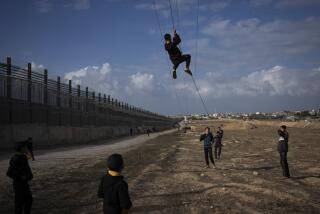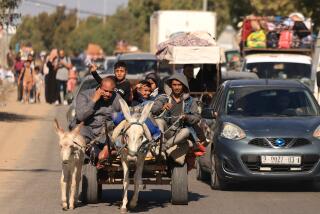Iraq’s Next Civil War Explosion May Be in Marshlands; Iran Warns of ‘Offensive’
- Share via
NICOSIA, Cyprus — The marshlands of southern Iraq--a maze of water, reeds and sodden islands--have proved tough terrain for a fight. What’s uncertain is whether they will mark the next explosion of civil war in a country still bristling with antagonism and fear.
For the past week, the Islamic government of neighboring Iran has been accusing Saddam Hussein’s Baghdad regime of preparing a heavy crackdown on remnants of the rebel Shiite Muslim forces that rose against him last March. Iranian President Hashemi Rafsanjani repeated the charges Wednesday, telling reporters in Tehran that his Shiite-led regime “cannot remain indifferent . . . and is trying to settle the issue through political channels.”
On Tuesday, Tehran Radio said Hussein’s planes were bombing Iraqi Shiites trapped in the marshes and were flying reconnaissance patrols as “part of preparations for the final offensive.”
However, reporters and relief officials who have driven through the marshland areas over the past 48 hours reported that there were no signs of a military buildup. Samir Nima, a ranking Iraqi diplomat at the United Nations in New York, called the Iranian charges, which have been reinforced by Iraqi exile claims, “totally unfounded.”
Pentagon spokesman Pete Williams said U.S. intelligence has spotted no evidence of massing Iraqi troops. A State Department spokesman agreed but noted that there have been scattered clashes between Iraqi soldiers and rebels since the Shiite insurgency was put down with heavy, indiscriminate firepower in late March.
Rafsanjani, in remarks monitored here on the official Islamic Republic News Agency, said Iranian officials have expressed Tehran’s concerns to the U.N. Security Council, and he declared: “We are making efforts together with the Security Council and other international bodies to prevent the recurrence of a tragedy.”
Tehran Television insisted Monday night that the battle had begun and that heavy explosions could be heard across the frontier from the vicinity of the Iraqi city of Amara. Tehran Television is controlled by Rafsanjani’s brother and represents the government line.
Iran’s more-radical media trumpeted what they called a crisis and laid some of the blame on the West. Hussein’s Sunni Muslim-based regime had begun a preliminary assault to “wipe out the Shiite community” in Iraq, charged the daily newspaper Jumhuri Islami. The paper said the purported developments have been met with a “deadly silence” in the West and spoke of “unconfirmed reports that a green light has been given to Saddam by the U.S. and France.”
With the accusations coming from Iran and Iranian-supported Iraqi exile organizations, the possibility exists that rival factions in Tehran are fanning the embers of the southern insurgency for political advantage. The Tehran Times, which also speaks for Rafsanjani, noted the armed sanctuary that the allies provided Iraq’s beleaguered Kurds in the north and editorialized: “The world community will face an uncertain and dark future if it does not rise and cry out in protest against the outrageous crimes Saddam is planning to commit in southern Iraq.”
In Geneva, U.N. Secretary General Javier Perez de Cuellar did in fact react to the plight of the Shiites. Wire services quoted him as saying that, in response to a letter from Tehran, the United Nations is prepared if necessary to set up camps for Shiite Muslims in southern Iraq just as it did for Kurdish refugees in the north.
But Perez de Cuellar added that U.N. relief efforts are being crippled by a shortage of funds. A report Wednesday from the Office of the U.N. Disaster Relief Coordinator said that only $134 million had been pledged in response to a U.N. appeal for $449 million for humanitarian work in the Persian Gulf.
Beyond concern for brother Shiites, Iran’s alarms also reflect the possibility that the country will be swamped again by refugees fleeing Iraqi arms. Tens of thousands of Shiites crossed the border in the March insurgency, and an estimated one million Kurds sought sanctuary in Iran when their rebellion collapsed. Studies have shown that Iran received a fraction of the international aid given Turkey for its role in helping the Kurds.
For Hussein, the Shiites present a greater threat. They number nearly 60% of the Iraqi population and, under Hussein’s Baath party rule, have been denied political power for two decades, despite the loyalty they gave Baghdad in the Iran-Iraq War.
Since the Iraqi defeat in the Persian Gulf War, Tehran has sought political support in the south and openly called for Hussein’s downfall. Iranian-based forces of Mohammed Bakr Hakim, an Iraqi exile leader, crossed the frontier to take part in the insurgency. Now, he is calling for allied-backed safe havens for Shiites in the south.
Hakim, head of the Supreme Assembly of the Islamic Revolution in Iraq, estimated that 600,000 to 800,000 Shiite refugees had taken refuge in the marshes, including some army deserters. Tehran Radio said 100,000 Iraqi troops have been sent to the area, and several unconfirmed reports said the Iraqis had blocked off the border strip, trapping the refugees in the marshes.
But as the Iraqi army learned in the 1980-88 war with Iran, the marshlands are easier to defend than to attack, and insurgents reportedly fled with their rifles and other small arms. In the Iran-Iraq War, Baghdad’s heavy artillery and superior air power could not dislodge the Iranians from some strongholds in the swamps. In one notorious case, the Iraqis stooped to the practice of electrifying the marsh water and electrocuting Iranian troops.
The marshes cover a broad expanse of southern Iraq, primarily above the confluence of the Tigris and Euphrates rivers north of Basra. Most of the refugees are reportedly hiding in the area east of the highway connecting Basra and Amara, the Hawizah marshes. Red Cross workers in Basra said a month ago that food supplies in the area were extremely tight, even though many of Iraq’s date farms are located there.
Ever since the insurgency, roads through the marshlands have been considered unsafe after dark. The region was dangerous even before the Gulf War. It was the site of the key battles of the 1980s war, where Iranian troops repeatedly tried to cut the Basra-Baghdad road. Iraqi deserters from that war held out in the swamps, safe in their knowledge of the maze-like water routes through the reeds. The marshes, once fabled for a placid life, became bandit country.
More to Read
Sign up for Essential California
The most important California stories and recommendations in your inbox every morning.
You may occasionally receive promotional content from the Los Angeles Times.













